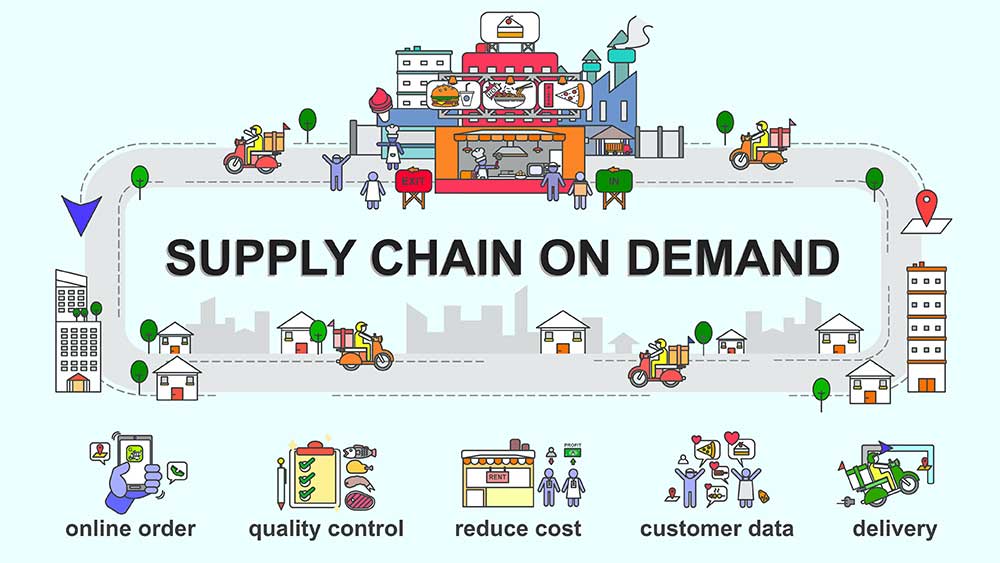
Have you heard of Cloud Kitchens? No, it is not about that one time when you forgot the dinner in the oven and the kitchen was filled with black clouds. Nor is it a free pizza with every virtual machine you spin up. Cloud kitchens are virtual restaurants without tables and waiters. Their consumer-facing side is open exclusively in the cloud, serving companies for food delivery like Uber Eats, GrubHub, DoorDash, and the likes. They are also known as ghost kitchens, shared kitchens, or virtual kitchens. Let’s see the impact such a model has.
It all started in 2017 when Uber Eats analyzed the neighborhood sales data and realized that there are unmet demands for particular cuisines. Powered with these insights, they went to the local restaurants and asked them if they can prepare a different type of food only for delivery and under a different brand. Since then, Uber Eats offers food from more than 4000 virtual restaurants, exclusively on their app.
The other food delivery companies followed suit, and the demand for kitchen spaces grew. In 2018 Travis Kalanick, the former Uber chief executive created a startup (called Cloud Kitchens) for incubating ghost kitchens.
This in itself is an interesting story about the insights that a business can get from its own data. But it also might be a curious signal from the future about the changing sources of value creation.
Let’s take a short look at the past. Up until 150 years ago, the primary source of value creation was the land. If you owned land, you had food; you were wealthy, you were a Lord. Then, with the industrial revolution, the source of value creation became the factory – built on top of the land. With industrialization came the expansion, and the value moved into infrastructure – railroads, power grid, telephone networks, etc. Then the computers took over, and the source of value moved to the data centers and the mainframes. The internet brought the rise of Google, Facebook, and Netflix – the Data and the Content became the kings of value creation.
And here we are today, instead of having flying cars and space colonies, we are talking about virtual kitchens.
Can Cloud Kitchens be the next unit of value? Will they reshape the world the same way Google and Amazon did?
Probably not!
What I see as the next unit of value is owning the business context.
Business context, the way that Uber Eats knows Who-Wants-What and matches it with Who-Delivers-What. The same way Uber itself matches passengers with drivers the moment they need a ride.
The demand meets the supply in real-time. The food will not be prepared or delivered by an Uber Eats employee and will not use any physical company assets. It will be prepared by a completely different company in a ghost restaurant and will be delivered by an independent driver.
This is a whole supply chain on demand. It emerges for a moment, delivers value to a customer (on the other side of the city), and then disappears.
Today it creates short supply chains of one customer and one supplier but imagine the possibilities. A customer (who forgot his anniversary) may order a special meal, flowers, and a dessert from a bakery, and the app will arrange the deliveries and bring them as an assembled order. Or a customer may want a custom-built bicycle – selects the parts from different vendors and picks up the bike at the assembler’s shop.
Imagine every service and every spare part becoming an item in a real-time digital catalog. Available to be ordered, implemented in a process, or delivered on-demand.
The companies of the future will not only be connected via 5G and running workloads in the cloud. They will be connected and will exchange data in real-time – orders, available capacity, assets, supply levels, delivery windows, etc. The business will be running at the speed of light. It will act as one virtual enterprise built from independent companies. Joining forces to meet the requirements of the increasingly digitized customer. This will give the participants a fighting chance against the digital giants like Amazon or Google.
And here is one of the exciting things about the ecosystems – they create a network effect. The more companies participate, the cheaper it gets. The more use cases are offered, the more partners join. On top of that, handling Data adds gravity and stickiness. The shared data enables use cases that attract more data until the data grows so much that it is hard for the companies to move it out – increasing even more of the network effect.
Ecosystems with such strong network effects tend to reward the early movers and penalize the laggards. You either start early and create your own gravity or find yourself in the crowded orbit of someone else. There are many examples of ecosystem players like Apple, Amazon, or Alibaba, who keep the balance between sharing enough value with their partners and keeping themselves as a key player in the ecosystem.
Swisscom is already enabling companies to run analytics on their own data in our infrastructure and provides sustainability reports based on strictly anonymized mobility data. Our privacy practices were verified by the Federal Data Protection Officer of Switzerland.
It is time to take a bolder stance and help Swiss companies reach their digital customers and become competitive in the digital world.
If you’re interested in this or any other data topic, feel free to reach out to me: Stefan Petzov, VP, Technology & Innovation @ Swisscom Outpost, Palo Alto, California, US, stefan.petzov@swisscom.com
September 14, 2020

